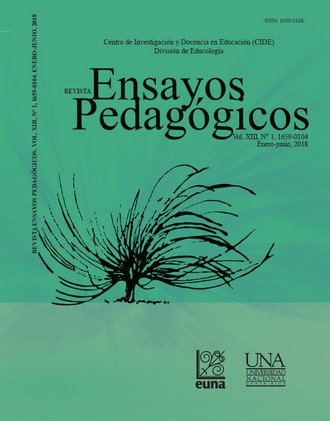Basic Office Management Project: An Educational Intervention for the Training of Commercial Education Faculty
DOI:
https://doi.org/10.15359/rep.13-1.8Keywords:
teacher training, educative intervention, teaching, social extension, modelAbstract
The proposal presented by the Proyecto Manejo Básico de Oficinas makes evident the importance of coordination between the strategic areas of the Universidad Nacional of Costa Rica, in this specific case, teaching and university extension. Innovative changes are proposed in the model of teacher training, making it flexible, more practical, more experiential, contextualized and according to the requirements, both social and student of Education Comercial curriculum. Furthermore, the model is enriched to increase opportunities for practice processes and training teachers to carry out their work with diverse populations, from youth, adults and seniors. A key point is how this experience of teacher training becomes both an educational intervention, which seeks to provide training opportunities to people in social disadvantage through non-formal education, and it favors the possibility of overcoming it personally, socially and occupationally. Therefore, this article intends to show the importance of an initiative that has enabled an innovative teacher training curriculum and address social needs through education by means of an extension and teaching project.
References
Corvalán, J. y Fernández, G. (2000). Apuntes para el análisis de la participación en experiencias educativas y sociales. Revista Latinoamericana de Estudios Educativos, 30(4), 9-50.
Darling-Hammond. (2006). Powerful Teacher Education. San Francisco, CA: Jossey-Bass a Wiley Imprint.
Eming, M. y Fujimoto, G. (2002). Desarrollo infantil temprano: Lecciones de los programas no formales. OEA- BID.
Godorokin, I. (2005. La formación docente y su relación con la epistemología. Revista Iberoamericana de Educación, 37(5), 2.
González, J. y otros. (2004). Tuning-América Latina: un proyecto de las universidades. Revista Iberoamericana de Educación, 35, 151-164
González, R. y González, V. (2007). Diagnóstico de necesidades y estrategias de formación docente en las universidades. Revista Iberoamericana de Educación, 43, 2-9.
Pogré, P. (2004). Los temas en cuestión. UNESCO/OREALC – PROEDUCA/GTZ, 120.
Remedi, E. (2004). De licenciado a maestro: Tiempos completos y certificados. Memorias de Congreso. México: CESU-UNAM.
Sánchez, I. (2014) Examen de síntesis. Doctorat en Sciences de l’Education. Université de Montréal. Canadá.
Santiago, A., Severin, E., Cristia, J., Ibarrarán, P., Thompson, J. y Cueto, S. (2010). Evaluación Experimental del Programa “Una Laptop por Niño” en Perú. Aportes. No. 5, 1-12.
Torres, R. y Tenti, E. (2000). Políticas educativas y equidad en México: La experiencia de la educación comunitaria, la telesecundaria y los programas compensatorios. SEP-IIPE UNESCO
Universidad Nacional de Costa Rica. (2013-2015). Proyecto de Extensión manejo básico de oficinas (Formulación). Heredia: Autor.
Universidad Nacional de Costa Rica. (2016). Pagina web. Recuperado de http://www.una.ac.cr/
Zúñiga, M. (2003). Aprendizaje mediado por tecnologías digitales: La experiencia de Costa Rica. Educación y nuevas tecnologías. Experiencias en América Latina IIPE-UNESCO.
Downloads
Published
How to Cite
Issue
Section
License
Ensayos Pedagógicos is subscribed to the Attribution-NonCommertial-NoDerivatives 4.0 International Creative Commons Licence, which allows both authors and readers to freely download, store, copy, and distribute the final approved publisehd version of the manuscript (post-print) as long as this is done without commercial purposes, no derivative works are generated, and the source and author are mentioned. As well, Ensayos Pedagógicos declares that authors will remain the rightful owners of the copyrights of their work in perpetuity.







